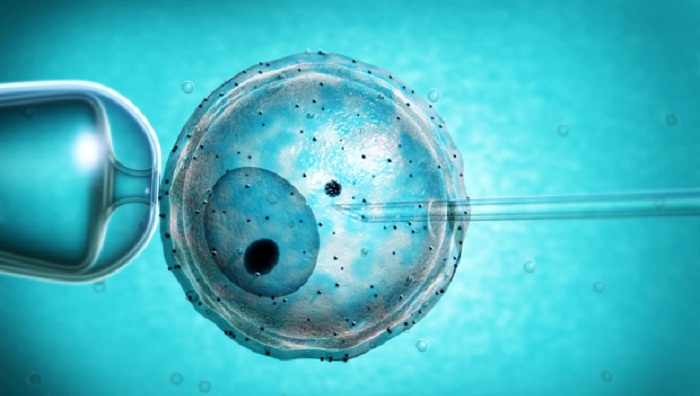Pascal Gagneux, Associate Professor University of California, San Diego, likened the problem to junk food timebomb, where the devastating health impact was not known for more than 50 years.
The oldest person to be born through IVF, British woman Louise Brown, is still only 37, so it is unknown if the procedure causes problems in later life.
Dr Gagneux believes that issues could arise because the healthiest sperm are not selected during assisted reproduction.
In natural conception millions of sperm fight their way through the female reproductive system where they are whittled down to the fittest hundred or so, and eventually the strongest reaches the egg.
But in IVF the egg is placed in a solution with millions of sperm, or else a lab technician selects just one with which to fertilise an egg.
Speaking at a the American Association for the Advancement of Science annual meeting in Washington, Dr Gagneux said IVF children could experience problems in later life.
"The jury is out though about whether these children are going to be healthy 80 years down the line and there are some worrying signs," he said.
"I wouldn’t rule out that they could have shortened lifespans. We are engaging in an evolutionary experiment.
"Assisted reproduction might have a combination of biological and social consequences that people haven’t considered enough.
"There is a process called capacitation which is really the massaging of the sperm by the female secretions in her reproductive tract that triggers the complete rearrangement of the cell membrane and only after that do mammalian sperm gain competency to fertilise.
"I am worried by the fact this is all being bypassed by in vitro technologies and even more so by new technologies where the choice of the sperm is made by a technician."

Fertilisation of an egg
The first ever "test-tube" baby was born in Britain in 1978. Since then five million babies have been born through assisted reproduction worldwide and around 180,000 are born in Britain each year through IVF.
But recent experiments have shown that female mice born through one sperm being injected into an egg – a process called intracytoplasmic sperm injection or ICSI – develop metabolic syndrome as they age, a combination of diabetes and obesity. Male mice were found problems with hormone function.
A study last year by the Swiss Cardiovascular Centre in Bern also found that assisted reductive children had poorer cardiovascular health.
More than 100 children were taken walking in the high altitude of the Swiss Alps, and those who had been born through IVF struggled more than natural born children, a sign that they will have poorer heart health as they age.
"The concern that by bypassing female choice at the level of sperm selection we might produce embryos which contain risk factors that you would otherwise not have," added Dr Gagneux.
"The big question for me is could we learn how to avoid potentially disastrous things that we are doing to these embryos because we don’t know everything yet."
Dr Gagneux said he was also concerned that embryos were "grown" for five days in plastic dishes which could damage their development.
"The big worry is that the embryo at that stage where you re-imprint all your genes, so the embryo is sensing its energy surroundings and we are putting that in an aquarium for five days.
"If you mess with epigenetic things like imprinting these are things that can go across generations as well.
"It could also introduce some very interesting costs if metabolic syndrome could be one of the consequences of starting an embryo out in rocket fuel, some minestrone mixture that lab people have developed because embryos survive well."
He likened the problem to the legacy of the fast food generation in the US.
"I would compare it to corn syrup and fast food in the US. It took 50 years. It was fantastic, everybody got bigger and healthier and now the US is the first generation that are shorter and heavier and die younger.
"But it took 50 years, everything looked hunky dory with the fast food instant calorie thing."
More about:
















































